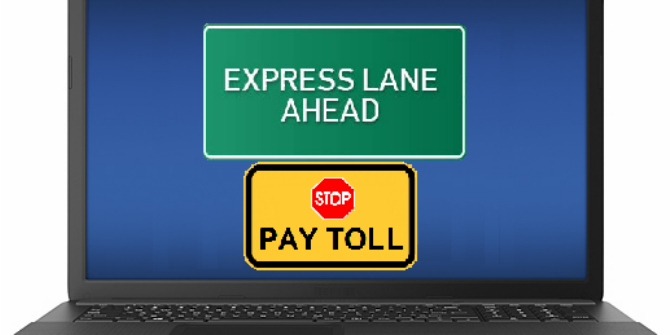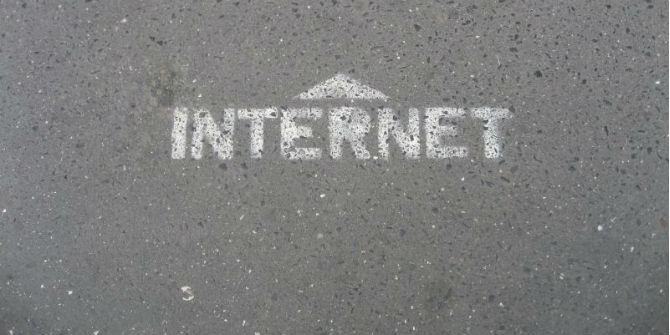 The technology scholar danah boyd recently gave a keynote speech at the 2018 SXSW Edu about media literacy. Her primary argument was that (in her words): “if we’re not careful, media literacy and critical thinking will be deployed as an assertion of authority over epistemology“. Many scholars have taken issue with her speech and boyd has written this response to them. Visiting Research Fellow in the LSE Department of Media and Communications and education expert, Ioanna Noula, outlines her take on the issue, and sets out why she thinks boyd is mistaken.
The technology scholar danah boyd recently gave a keynote speech at the 2018 SXSW Edu about media literacy. Her primary argument was that (in her words): “if we’re not careful, media literacy and critical thinking will be deployed as an assertion of authority over epistemology“. Many scholars have taken issue with her speech and boyd has written this response to them. Visiting Research Fellow in the LSE Department of Media and Communications and education expert, Ioanna Noula, outlines her take on the issue, and sets out why she thinks boyd is mistaken.
Danah boyd sparked a lively debate with her recent keynote at the 2018 SXSW Edu, where she strongly questioned the power of media literacy to strengthen individual agency and tackle the asymmetries of the media ecosystem that erode democratic living. Her argument on the inadequacy of media literacy to empower young people and her claim that media literacy and critical thinking could in fact render individuals more vulnerable to media manipulation practices was particularly provocative for media literacy advocates, who swiftly responded to this critique by offering evidence of success in education settings and insights on critical thinking.
In her response to criticism, boyd insisted on her critique of critical thinking stating that “if we’re not careful, media literacy and critical thinking will be deployed as an assertion of authority over epistemology”. I find particularly bizarre the fact that, although critical thinking lies at the core of her argument, boyd does not provide a clear explanation of what she understands as critical thinking. This omission, along with the lack of references to examples of media literacy pedagogy and practice, are telling of a lack of an informed understanding of contemporary realities in education. She appears to follow a monolithic interpretation of critical thinking as the skills of formal and informal logic that apparently draws on the tradition of positivism which has shaped prevalent definitions of critical thinking. Positivistic approaches associate critical thinking with the ability to evaluate information, identify sources and/or assess their reliability and credibility and rationally determine truth, fallacy or fabrication.
Critical thinking. Missing the point?
Boyd evidently associates critical thinking with the human predisposition or the taught skill to cast doubt on everything. She rebukes formal education for planting the seeds of doubt to students’ thinking, arguing that it is this disposition that media take advantage of to manipulate the public. In this line of argument, her claim that critical thinking is the dominant pedagogical approach in schools and her sweeping rejection of the concept, contradicts critical educational research and theory that argues that critical thinking and its pedagogical application remain widely debated topics in education scholarship, and a question for pedagogical practice. Boyd fails to make the crucial point that critical thinking has become a multipurpose and rather abused term in education curricula, and that for different education theorists and practitioners, critical thinking acquires different meanings. These approaches to critical thinking range from narrow logistic understandings (critical thinking as “rules of inference and appraisal characteristic of logical analysis”) to emancipatory perspectives originating in critical theory (critical thinking as the ability to decipher social inequalities, class struggle and power relations).
Proponents of Critical Pedagogy – a movement on the sidelines of educational theory- argue that the prevalent rational approach to critical thinking is an already perverted version of the concept. Their point of view is that mere focus on evaluation and logical decision-making undermines the mission of education to empower students and galvanise social change. Henry Giroux argues that critical thinking has been widely misused to disguise the advancement of dominant ideologies. On the contrary, Critical Pedagogues advocate that critical thinking should encourage students to engage reflectively, deliberatively and relationally with their lifeworld enabling them to explore the ambiguities and moral drivers of human action.
In her response to critical reactions from education scholars and experts such as Renee Hobbs, boyd attempts to defend her thesis, but contradicts her original argument. In her original speech, boyd argues that critical thinking consists of the mere defence of epistemological standpoints. However, her alluding to the possibility and benefits of a “cognitive disconnect” that would enable individuals to appreciate facts over misinformation, is indicative of her own positivist approach to critical thinking. At the same time, her suggestion that people should not be inquisitive about the intentions behind messages implies the irrelevance of ethics in her argument, and further obscures the role of power and self-interest as drivers of human behaviour that engender inequalities and establish the dominance of corporations. It should be noted that the lack of inquisitiveness is characteristic of many media literacy skills-based approaches.
What about education?
Revealing her position with regard to the socio-political role of education and its potential to address the ‘fake news’ problem, boyd states: “When I try to untangle the threads to actually address the so-called “fake news” problem, I always end in two places: 1) dismantle financialized capitalism (which is also the root cause of some of the most challenging dynamics of tech companies); 2) reknit the social fabric of society by strategically connecting people. But neither of those are recommendations for educators”.
I can’t agree more with her point that the current socio-political reality accounts for the most part of the “fake news” challenge. However, boyd’s claim above is that social change does not fall within the remit of education, and I am not sure whether many education theorists and practitioners would agree with this viewpoint. Her approach clashes not only with critical sociological approaches to education but also with the majority of mainstream educational theories that approach school as an apparatus of social reproduction.
At this point I wish to call attention to the theory of Critical Pedagogy which makes the clearest point about the role of education in driving social change and also places critical thinking at the heart of the development of self-awareness. Critical thinking is in fact valued as the main enabler of social change. Critical Pedagogy locates the origins of critical thinking in pedagogical relations arguing that critical thinking begins with students’ acknowledgment of oppressive relations and the realisation of their own place in social structures. This emphasis on oppression provides an answer to boyd’s concerns over gaslighting through education.
Declaring Critical Pedagogy as my theoretical and epistemological point of view I may appear to be confirming boyd’s main argument that critical thinking consists of a battle of epistemologies. However, one of the fundamental tenets of Critical Pedagogy is that education and critical thinking should aim to encourage self-reflection and self-awareness. This process is meant to enable students to acknowledge, understand and contextualise their own epistemological biases rejected by boyd.
Doubt and Critique
It appears that boyd’s failure to theorize the concept of critical thinking subverts the present debate on media literacy and obscures the ideological issues at stake. Boyd’s argument on the perils of media literacy is based on an unnuanced equation of critical thinking with the elements of doubt and critique. It is true that like the notion of empowerment, doubt and critique have also been co-opted and distorted in the interests of commercial and political agendas, including radicalisation. Doubt and critique can be dangerous when introduced as skills in their own right and cultivated in competitive classroom environments that sustain the socio-cultural premise of neoliberalism. Doubt and critique can be toxic when driven by arrogance and strong loyalties. They can be game changers when used in a spirit of open-mindedness and modesty which can be cultivated in an inclusive and participatory pedagogical environment. Doubt and critique should be values and acts that emanate from dialogue and serve the purpose of social justice. To that effect they should be acknowledged, debated and equally scrutinised for the purpose they serve in a given context but they should always be recognized as indispensable to educational processes that aim to challenge the status quo.
This article gives the views of the author and does not represent the position of the LSE Media Policy Project blog, nor of the London School of Economics and Political Science.






2 Comments